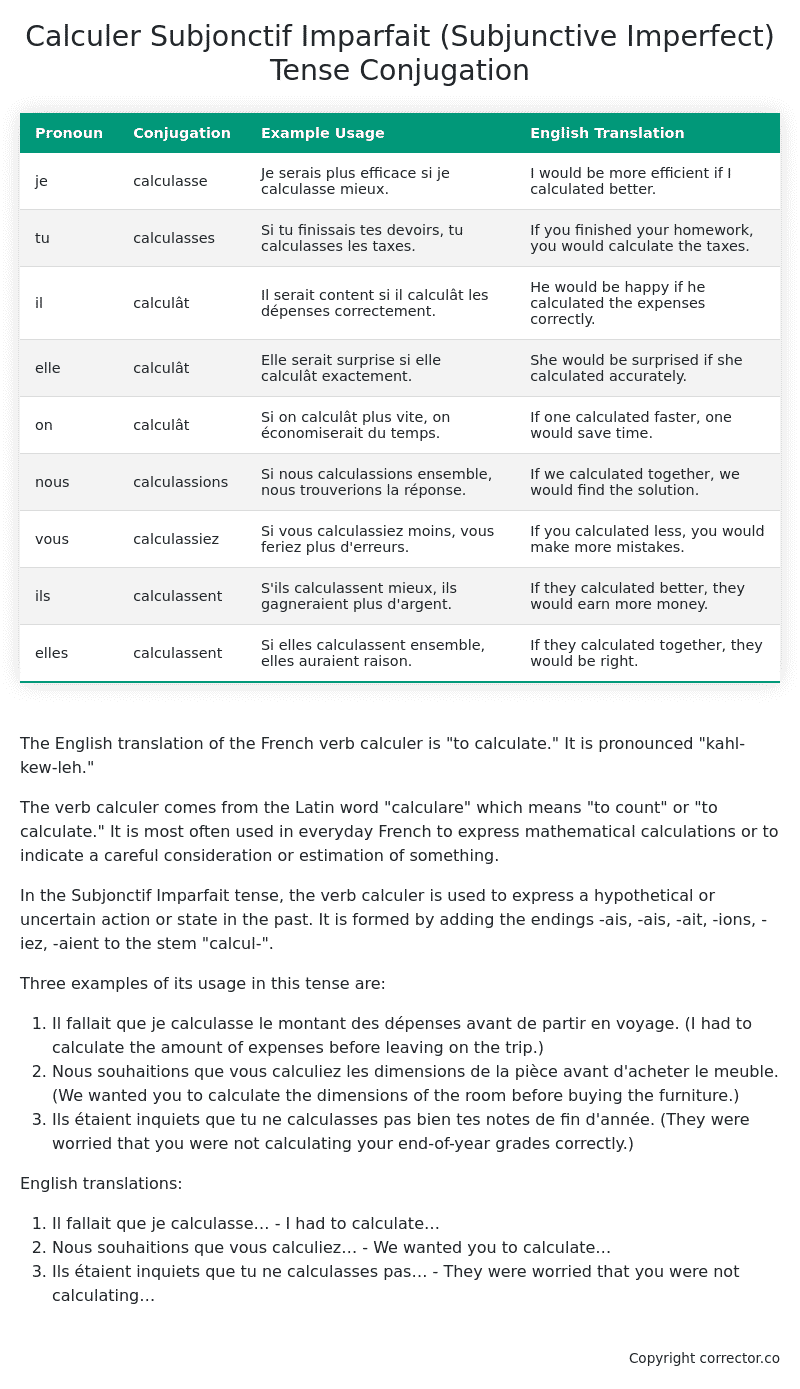Subjonctif Imparfait (Subjunctive Imperfect) Tense Conjugation of the French Verb calculer
Introduction to the verb calculer
The English translation of the French verb calculer is “to calculate.” It is pronounced “kahl-kew-leh.”
The verb calculer comes from the Latin word “calculare” which means “to count” or “to calculate.” It is most often used in everyday French to express mathematical calculations or to indicate a careful consideration or estimation of something.
In the Subjonctif Imparfait tense, the verb calculer is used to express a hypothetical or uncertain action or state in the past. It is formed by adding the endings -ais, -ais, -ait, -ions, -iez, -aient to the stem “calcul-“.
Three examples of its usage in this tense are:
- Il fallait que je calculasse le montant des dépenses avant de partir en voyage. (I had to calculate the amount of expenses before leaving on the trip.)
- Nous souhaitions que vous calculiez les dimensions de la pièce avant d’acheter le meuble. (We wanted you to calculate the dimensions of the room before buying the furniture.)
- Ils étaient inquiets que tu ne calculasses pas bien tes notes de fin d’année. (They were worried that you were not calculating your end-of-year grades correctly.)
English translations:
- Il fallait que je calculasse… – I had to calculate…
- Nous souhaitions que vous calculiez… – We wanted you to calculate…
- Ils étaient inquiets que tu ne calculasses pas… – They were worried that you were not calculating…
Table of the Subjonctif Imparfait (Subjunctive Imperfect) Tense Conjugation of calculer
| Pronoun | Conjugation | Example Usage | English Translation |
|---|---|---|---|
| je | calculasse | Je serais plus efficace si je calculasse mieux. | I would be more efficient if I calculated better. |
| tu | calculasses | Si tu finissais tes devoirs, tu calculasses les taxes. | If you finished your homework, you would calculate the taxes. |
| il | calculât | Il serait content si il calculât les dépenses correctement. | He would be happy if he calculated the expenses correctly. |
| elle | calculât | Elle serait surprise si elle calculât exactement. | She would be surprised if she calculated accurately. |
| on | calculât | Si on calculât plus vite, on économiserait du temps. | If one calculated faster, one would save time. |
| nous | calculassions | Si nous calculassions ensemble, nous trouverions la réponse. | If we calculated together, we would find the solution. |
| vous | calculassiez | Si vous calculassiez moins, vous feriez plus d’erreurs. | If you calculated less, you would make more mistakes. |
| ils | calculassent | S’ils calculassent mieux, ils gagneraient plus d’argent. | If they calculated better, they would earn more money. |
| elles | calculassent | Si elles calculassent ensemble, elles auraient raison. | If they calculated together, they would be right. |
Other Conjugations for Calculer.
Le Present (Present Tense) Conjugation of the French Verb calculer
Imparfait (Imperfect) Tense Conjugation of the French Verb calculer
Passé Simple (Simple Past) Tense Conjugation of the French Verb calculer
Passé Composé (Present Perfect) Tense Conjugation of the French Verb calculer
Futur Simple (Simple Future) Tense Conjugation of the French Verb calculer
Futur Proche (Near Future) Tense Conjugation of the French Verb calculer
Plus-que-parfait (Pluperfect) Tense Conjugation of the French Verb calculer
Passé Antérieur (Past Anterior) Tense Conjugation of the French Verb calculer
Futur Antérieur (Future Anterior) Tense Conjugation of the French Verb calculer
Subjonctif Présent (Subjunctive Present) Tense Conjugation of the French Verb calculer
Subjonctif Passé (Subjunctive Past) Tense Conjugation of the French Verb calculer
Subjonctif Imparfait (Subjunctive Imperfect) Tense Conjugation of the French Verb calculer (this article)
Subjonctif Plus-que-parfait (Subjunctive Pluperfect) Tense Conjugation of the French Verb calculer
Conditionnel Présent (Conditional Present) Tense Conjugation of the French Verb calculer
Conditionnel Passé (Conditional Past) Tense Conjugation of the French Verb calculer
L’impératif Présent (Imperative Present) Tense Conjugation of the French Verb calculer
L’infinitif Présent (Infinitive Present) Tense Conjugation of the French Verb calculer
Struggling with French verbs or the language in general? Why not use our free French Grammar Checker – no registration required!
Get a FREE Download Study Sheet of this Conjugation 🔥
Simply right click the image below, click “save image” and get your free reference for the calculer Subjonctif Imparfait tense conjugation!

Calculer – About the French Subjonctif Imparfait (Subjunctive Imperfect) Tense
Formation
Common Everyday Usage Patterns
Interactions with Other Tenses
Subjonctif Présent
Indicatif Passé Composé
Conditional
Conditional Perfect
Summary
I hope you enjoyed this article on the verb calculer. Still in a learning mood? Check out another TOTALLY random French verb conjugation!


